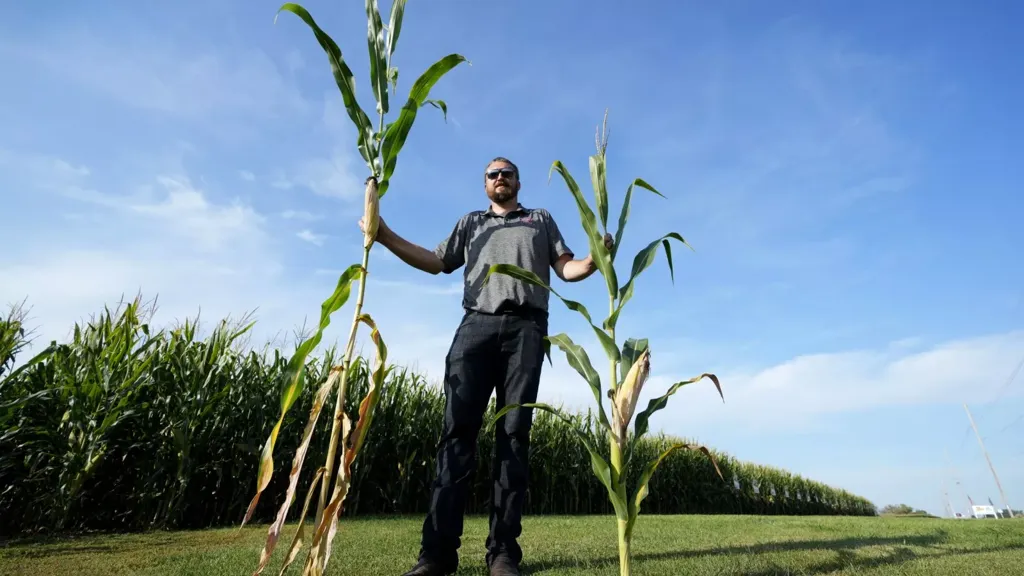Donald Trump's once-solid grip on Iowa may be loosening, as voters voice concerns over his policies on healthcare, renewable energy and agriculture -- signaling the "first in the nation" presidential nominating state could again become a battleground.
For nearly a decade, Iowa has leaned Republican. Trump carried it by 9 points in 2016, 8 points in 2020, and about the same in 2024. "Iowans understand that President Donald Trump is the most consequential president of our lifetimes," wrote Joe Mitchell, a former Republican state lawmaker, in the Des Moines Register. "We would vote for him three more times if we could."
But national polls and local sentiment suggest his margin of support is narrowing.
Democrats and independents argue that key parts of Trump's agenda -- from cutting Medicaid to promoting cane sugar over corn syrup -- are alienating voters in this farm-heavy state. Ben Nuckels, a Democratic strategist, told Newsweek that Trump and his allies are "gutting health care, decimating Iowa's rural hospitals, cutting food assistance, exploding the federal deficit, and raising costs -- all to give massive tax giveaways to their billionaire coastal donors."
He cited an analysis from the Kaiser Family Foundation showing that Iowa's rural hospitals -- which make up nearly 68 percent of the state's community hospitals -- stand to lose $4.45 billion in Medicaid funding under Trump's policies.
"Republicans talk about rural values, then cut the clinics and hospitals rural families depend on," Nuckels said.
Iowa hasn't been considered a swing state in years, but that could be changing, according to Julie Stauch, an Iowa Democrat and former gubernatorial candidate.
"People on the ground here are definitely very angry about a wide variety of things Republicans are doing," she told Newsweek. "They're allowing themselves to be intimidated by a bully... but voters feel the impact of those decisions." She hears daily concerns about Medicaid cuts, clean water problems, and declining support for public schools.
Trump's push for Coca-Cola and other companies to replace corn syrup with imported cane sugar has sparked particular outrage in Iowa, where corn is a cornerstone of the economy. Farmers fear the move not only undercuts one of their key markets but also shifts economic benefits to Florida -- the nation's top cane sugar producer -- at Iowa's expense.
"All of our corn sweetener comes from American farms, raised by American farmers and processed in American plants," said Mark Mueller, a corn and soybean farmer from Waverly, Iowa, who told Newsweek the move was "a betrayal" of Trump's own "America First" pledge.
"What happened to the 'Make it in America' mindset?" Mueller asked, warning that even a small hit to corn prices -- just a nickel or dime per bushel -- could crush farmers in an industry already operating on razor-thin margins.
The Corn Refiners Association, an industry trade group, backed Mueller's concerns, estimating that eliminating high-fructose corn syrup from U.S. food and beverage supply chains could cut corn prices by up to 34 cents a bushel and result in a $5.1 billion loss in farm revenue.
"The resulting economic shockwave would lead to rural job losses and significant economic consequences to communities across the country,"
Stauch likened the voter mood to a tsunami gathering offshore. "By the time we get to the election, I think we're going to find out we have a tidal wave on our hands," she said. "People are pissed off. They're angry."
Still, Republicans remain publicly confident in Trump's standing. Iowa GOP chairman Jeff Kaufmann told Fox News in July that Trump "hasn't forgotten who brought him to the dance," calling his return to the state for Independence Day celebrations "very symbolic."
Republican strategist Nicole Schlinger added, "From the day his helicopter first landed here in 2015, Trump has had a special connection with Iowa. He's straight-talking, hardworking, and unapologetically proud of our country -- just like Iowans."
While many Democrats believe these controversies present an opportunity to flip the state, others caution that partisan identity remains strong in rural Iowa. "Even when farmers were upset in 2020 over ethanol waivers and trade wars, Trump still carried the state comfortably," University of Northern Iowa political scientist Christopher Larimer told Newsweek.
Yet Trump's antagonistic stance toward wind energy -- a powerhouse industry in Iowa -- has also added to the sense of broken promises among some voters. Iowa generates more than half its electricity from the 6,000 wind turbines that dot its fields and pastures and employs thousands in the sector. Yet Trump recently called windmills "big, ugly" and rolled back federal incentives for renewables.
His rollback accelerates the phase-out of wind tax credits, requiring projects to be completed by 2027 instead of the 2030s, and halts new wind leases on federal lands. The American Clean Power Association warns these policies could threaten more than 130,000 jobs tied to wind energy nationwide, many in Iowa.
While Democrats are hopeful that discontent over Trump's policies could reopen Iowa as a battleground, there is still a long way to go to turn it blue. The GOP, for its part, appears unconcerned for now about losing Iowa's six electoral votes, which were last won by a Democrat when Barack Obama carried the state in 2012.
